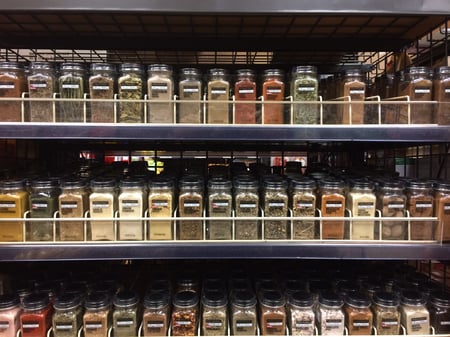Is your pantry stocked well so that you are set up for success in the kitchen? Or do you find yourself running to the store for last-minute ingredients all of the time? If you are a newer home cook taking your first steps into the kitchen, it can be helpful to know what you should have on hand at all times. These basic kitchen needs are enough for a blog series, but let's start with spices, vinegars and oils first.
Spices, Vinegars and Oils
When selecting spices and vinegars, it's a good idea to keep in mind quantities. Buy smaller quantities and more often, especially when it comes to spices. Spices are sensitive to light and air as it will affect their flavor so it's important to keep them dry and sealed in individual containers to preserve their freshness.
Here's my list of pantry essentials:
Seasonings
- Black pepper. Freshly ground pepper is best so get a grinder and purchase whole peppercorns.
- Smoky paprika boosts big flavor in your dishes. We like to call it "vegetarian bacon" because it provides a smoky flavor without any meat.
- Nutmeg is great for potato and pasta dishes.
- Red chili flakes tastes delicious on pizza and can also be used to add heat to any dish.
- Cumin is an essential spice for ethnic dishes, plus it's great on poultry.
- Coriander is mainly used in Mediterranean flavors and for baking.
- Maldon Sea Salt is my choice for seasoning. This pure salt comes in large flakes, it maintains moisture and, unlike other sea salts, it dissolves in cold water. I keep mine in a salt pig on the counter so that it is always handy.
When selecting spices, start with the basics. You can always add to your collection once you start experimenting in the kitchen. The Chopping Block's cooking classes are a great way to be exposed to a wide variety of spices and flavors. Our Culinary Adventure Trip to India class focuses on different spice blends and how they work together in food. I guarantee there are some spices featured in that class that you may not have worked with before!

Vinegars
- White vinegar is used for poaching eggs. It's also great for cleaning.
- White and dark balsamic vinegar are a must for your homemade vinaigrettes.
- Apple cider vinegar is perfect for marinades and sauces including herb based sauces.
- Champagne vinegar has high acidity so it's nice for vinaigrettes and marinades.
Oils
- Grapeseed oil has a high smoke point and is neutral in flavor which makes it a good choice for vinaigrettes, especially fruit based vinaigrettes. Olive oil can be overpowering at times, while grapeseed oil lets the flavors speak for themselves.
- Extra virgin olive oil should be used to finish a dish and in marinades. It has a low smoke point, so if you use it for cooking, do not overheat it or let it smoke!
Stay tuned next month for part two of the Building Blocks Of Cooking series. I'll discuss kitchen tools, including knives and essential equipment every home cook should have.
If you want to learn more about how oils, vinegars, spices and herbs play into your cooking, don't miss our Flavor Dynamics class coming up in August. It's part of our Cooking Lab series that focuses on transforming your skills.
